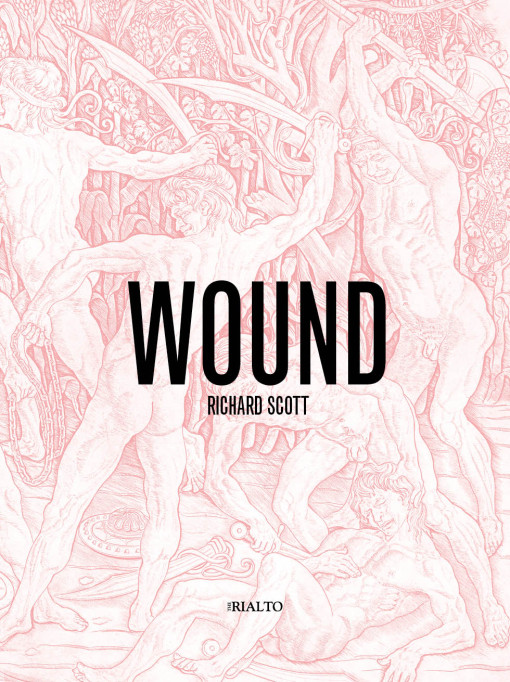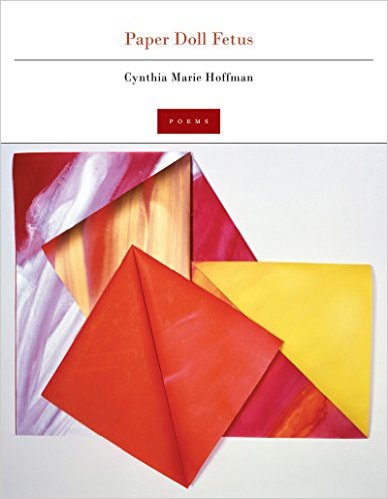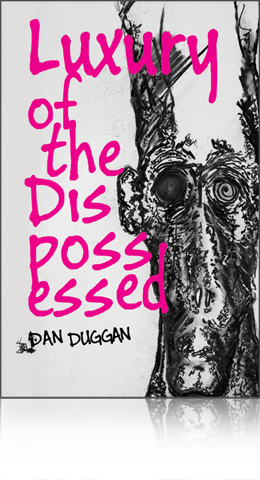Wound by Richard Scott
– Reviewed by Bethany W Pope –
Richard Scott’s Wound opens with two epigraphs, one directly above the other, both centred on the page. The first and uppermost comes from Walt Whitman: ‘Through you I drain the pent up rivers of myself’. The second, buried beneath the first like an unconscious thought, belongs to Michael Robbins, ‘You say that this is all there is: / sweat and piss and blood and jizz.’. Two thoughts, one ranked ‘high’ on whatever scale is used to judge the worth of an object of culture, the other a bit of deeply-transgressive near-doggerel, perfectly capture the spirit and the thrust of this luridly beautiful, delicately painful pamphlet.
The terrible, transgressive beauty of shame-filled acts (acts which are viewed, by the perpetrator, to be shameful — not acts which are shameful in themselves) forms the beating, blood-brimmed heart of these poems. In ‘Trainee Priest At Rochuskapelle’ the titular young man meditates on the sexual beauty of a statue of Saint Sebastian who stands by the altar with his face covered, so that his beauty cannot distract the parishioners from the ritual desolation of Lent. The young priest is enamoured by the shape of the body, and drawn to the vulnerability revealed through the sculptured pain:
While the priests are diluting wine
I would have him tug off his sack, step down, walk.
I will lie him across my lap, pull out the cock-feathered arrows,wash the holes in his body, sew them up
with my mother’s darning needle, ask if I will be forgiven
for wanting his delicate blood on my fingers.
Forced solitude often warps a desire for intimacy. The priest-in-waiting is, by necessity, held apart. He can express sexual love only through other, ‘acceptable’ channels. So a lust for sex is buried in a passion for nurturing, staining the purity of the bandage.
Attraction and disgust are closely linked. Often, it is the thing we fear, the thing which initially repulses us, which blooms into a pleasure-giving fetish. The poem ‘My Stag’ explores this subject in great detail. Here, a schoolboy watches as one of his fellows dissects and then consumes a stag beetle. The deconstructed insect is described in loving terms (‘agate legs’, ‘Tiffany lamp wings’) before the crumbled corpse is consumed:
to complete the bet
Ian chased each body part down
with a swig of cherry cola.
Witnessing this, the other boys flee. They lack the speaker’s discerning eye for beauty. They are not attracted to the capacity for causing pain. The speaker is different, ‘I had the stomach for it, I was in love’. He closes the poem, longing for a kiss.
The final poem in the pamphlet is also the strongest. ‘Public Toilets In Regent’s Park’ uses lush, baroque language to reveal beauty hidden in filth as desperate men slip past the watchful eyes of the toilet attendants to engage in something dangerous and vivid:
All for the thrill of placing their knees
on the piss stained cold, the iris shimmering
behind a hand-carved glory hole,
a beautiful cock unfolding like a swan’s neck
from the Harris Tweed of a city gent’s suit.
This pamphlet might be too much for the faint of heart — though it is arguable that it is exactly the sort of book that the spiritually timid most need to read. There’s no easy reading here, just a beautifully queasy ambiguity that, once wrestled with, reveals something strange and very real.





